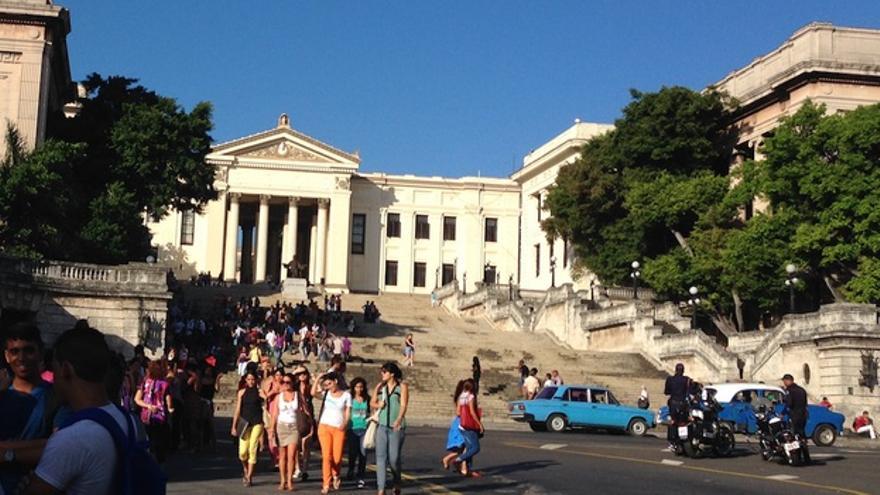
![]() 14ymedio, Marcelo Hernández, Havana, January 11, 2019 — Meetings, morning assemblies, and talks in high school courses and university faculties all over the country are some of the strategies that the Cuban Government has put into practice to promote the Yes vote among the youngest voters, especially those who, in the February 24 referendum on the new Constitution, will cast a vote at the polls for the first time.
14ymedio, Marcelo Hernández, Havana, January 11, 2019 — Meetings, morning assemblies, and talks in high school courses and university faculties all over the country are some of the strategies that the Cuban Government has put into practice to promote the Yes vote among the youngest voters, especially those who, in the February 24 referendum on the new Constitution, will cast a vote at the polls for the first time.
Since classes resumed in January, after the end of year break, the official Yes campaign for the new Constitution has landed in upper secondary and university classrooms via conferences, discussion groups, and classes. Professors call for the ratification of the Constitution in order to “maintain the achievements of the Revolution” and “keep the country from falling into the enemy’s hands,” according to students’ testimonies gathered by 14ymedio.
The promotion of the Yes vote extends to activities organized by the Secondary School Students’ Federation (FEEM) and the University Students’ Federation (FEU).
Additionally, the subject has come up at school morning assemblies in all State institutions, where harangues and calls to “support the Revolution” with a Yes vote are abundant.
“They informed us of the new content of the Defense Preparation course last Monday at the morning assembly,” a 12th grade student in a high school program in Old Havana tells this newspaper. “We already had the first class and the whole time they talked to us of the importance of voting Yes because that was the only way to protect the homeland from its enemies and to be able to keep healthcare and education free,” he adds.
The teenager, who turned 16 in November, assures that the professor teaching the material asserted that “a No is counterrevolutionary” and those who “vote No want to destroy the country and all the achievements of the Revolution.” The class segment on this subject lasted 45 minutes and “the whole time was about the importance of attending the referendum and not letting oneself be influenced by those who are calling for a No vote.”
Other testimonies gathered in Santiago de Cuba, Villa Clara, and Sancti Spíritus confirm that it is a strategy at the national level of which the Ministries of Education and of Higher Education refused to give details to questions from this newspaper.
In Santa Clara, Jean Carlo, 16, has already heard two talks on the subject in his high school program. “At the first one a man dressed as a soldier came and joined the professor and said that from the United States they were financing counterrevolutionaries to promote the campaign for No,” he remembers.
“The other time it was taught by the history teacher and she explained to us that we are in a very important moment for the Revolution, and if it was the responsibility of some to attack the Moncada Barracks and of others to fight in Girón (the Bay of Pigs), it’s our responsibility to fight so that Yes wins in the referendum.”
In universities all over the Island, which in the 2018-2019 school year have some 240,000 students, the official Yes campaign has also begun in classrooms, even though until the last days of January, students in higher education take their final exams of the semester and only come to the institutions to do reviews or take exams.
“Every day they say something, in some review (for exams) or in some appeal from the FEU,” says Brandon, 21, who is enrolled in one of the faculties of the iconic University Hill in the nation’s flagship university in Havana. “The students listen but almost nobody asks or says anything, they only hear,” he emphasizes.
The situation recalls the so-called Battle of Ideas, an ideological turn of the screw that Fidel Castro pushed at the beginning of this century. The intense campaign included weekly public actions, known as Open Forums, the creation of a red guard of very aggressive young people, known as “social workers,” and more political activities in schools.
However, with Raúl Castro’s arrival to power many of those programs broke up for lack of resources. “It’s not that ideology has been relaxed in schools, much less in universities, but that there weren’t funds to sustain all that propagandistic machinery,” believes Katty, a recent graduate in pedagogy.
In the last week the Cuban Government has intensified its Yes campaign on national media and has placed advertisements for Yes at baseball games and in the news on national television. However, promoters of No or of abstention do not appear in any of these settings.
Translated by: Sheilagh Carey
______________________
The 14ymedio team is committed to serious journalism that reflects the reality of deep Cuba. Thank you for joining us on this long road. We invite you to continue supporting us, but this time by becoming a member of 14ymedio. Together we can continue to transform journalism in Cuba.
